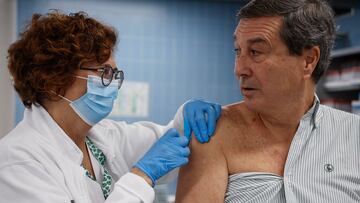What is the difference between covid, flu and RSV? Symptoms and treatment
With similar symptoms, covid-19, flu, and RSV can be hard to tell apart. As illness numbers pick up over winter there is no better time to find out more.


The three illnesses are circling this winter, covid-19, the flu, and RSV. They are all respiratory illnesses, but they are caused by different viruses and have some differences in terms of symptoms, severity, and treatment.
To confirm any illness, we advise you to speak with a medical professional because this guide will only cover the symptoms to watch out for and available tests to confirm a diagnosis at home.
They have a few symptoms in common, including fever, runny nose, and cough.
| Symptoms | Covid-19 | Flu | RSV |
|---|---|---|---|
| Sore throat | x | x | |
| Decrease in appetite | x | ||
| Coughing | x | x | x |
| Sneezing/Runny nose | x | x | x |
| Fever and/or chills | x | x | x |
| Wheezing - Shortness of breath or difficulty breathing | x | x | |
| Headaches | x | x | |
| Muscle or body aches | x | x | |
| New loss of taste or smell | x | ||
| Nausea or vomiting | x | ||
| Diarrhea | x | x | |
| Fatigue | x | x |
In infants the symptoms differ slightly and could present as decreased activity, irritability, and difficulty breathing.
If a child is having problems breathing or keeping fluids down, or if their case becomes more severe, the CDC advises that parents contact a healthcare professional. There are no treatments, like antibiotics for RSV. Still, some infants and children are hospitalized and given fluids through an IV and other medications that can help decrease the severity of the symptoms.
What to do if you think you have RSV
If you or someone close to you has symptoms and are in a high-risk group, talking to a medical professional is advised. Most people will be able to recover by resting, drinking fluids, and taking over-the-counter medications to manage symptoms.
However, if symptoms worsen, hospitalization may be necessary. The CDC says that parents should check with their pediatrician before giving their children medications and that aspirin should not be given to them.
#RSV season occurs every year, and now is the time to take preventive action to keep your child safe. Learn more about Respiratory Syncytial Virus (RSV), what the symptoms are, and how to prevent it by visiting @CDCgov’s website: https://t.co/J7zXh7qusK. pic.twitter.com/4VP1GQqjzg
— HHS.gov (@HHSGov) November 28, 2022
What to do if you think you have covid-19
The first step if you or someone close to you is showing symptoms is to take an at-home rapid test or find a free testing site in your area. If the test is positive, you can report it to your doctor.
Related stories
If you are at a higher risk for severe infection, they may prescribe you an anti-viral medication that helps to prevent hospitalization and death. Taking this medication as early as you can help the chance of it working, so if you feel symptoms coming on, it is always a good idea to take a test.
What to do if you think you have the flu
Unlike covid-19, there are no over-the-counter flu tests that can be taken at home. Like covid-19, if you are at high risk for severe infection, make sure to call your doctor as they may be able to prescribe an anti-viral to “lessen symptoms and shorten the time you are sick by 1 or 2 days.”

